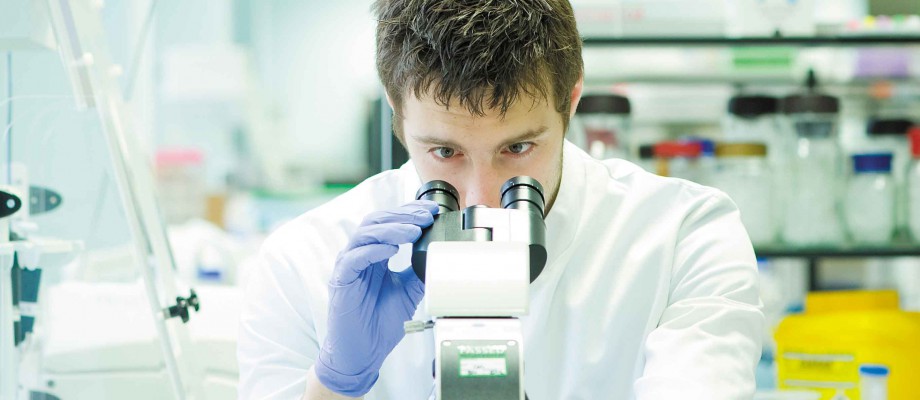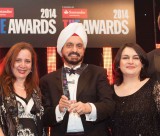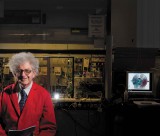
UNICAS: speed-dating for researchers
March 3rd, 2015
Imagine speed-dating where the familiar questions ‘what do you do’ and ‘what are you looking for in a partner’ can lead to some less predictable and potentially exciting conclusions.
Nottingham encourages its academics to do just this at ‘sandpits’, where researchers meet to share ideas, find collaborative partners and apply for funding.
Bringing researchers from across the spectrum of schools and departments together in this way to promote inter-disciplinary projects is a key strategic aim of the University.
Such events are hosted by UNICAS – The University of Nottingham Interdisciplinary Centre for Analytical Science – which offers funding for research projects that bridge gaps between disciplines and also encourages the sharing of equipment and analytical science.
Professor Andrei Khlobystov, the chairman of UNICAS, says the sandpits are indeed a little like speed-dating: “It’s informal, with quick presentations from participants – my name, what I do and what I hope to achieve, what I can offer, what I’m looking for in terms of input.”
Researchers form groups united by a scientific challenge or a technique. They also pool expertise and share resources, such as analytical equipment.
They can then make an application to UNICAS for funding to help get their research project off the ground. To qualify for the University-funded grants researchers must draw in collaborators from at least two different disciplines. Postgraduate applicants can apply up to £5,000 and academics and research staff can be awarded up to £15,000.
As Professor of Nanomaterials and Director of Nottingham Nanoscience and Nanotechnology Centre, Andrei can himself point to a collaboration made possible by UNICAS.
He joined Dr Graham Rance from Chemistry and the Nanotechnology and Nanoscience Centre’s Dr Michael Fay in working with Dr Lyudmila Turyanska and Professor Amalia Patanè of the School of Physics and Astronomy.
“Graham is working on quantum dots and carbon nanotubes and at a UNICAS sandpit he met Lyudmila and Amalia and discovered they were interested in similar things,” said Professor Khlobystov. “We are able to investigate the physical properties of these nano materials thanks to the fantastic instrumentation they have in Physics. Hopefully it will lead to some important applications – these structures could be used for photocatalysis: using light to promote auxiliary chemical reactions, which is very topical as we look at light as a sustainable source of energy.”
By funding such small-scale collaborations, UNICAS opens the way for larger external grant applications.
Ginny Birney, UNICAS Project Manager, who is based in Research and Graduate Services, said that between 2012 and 2015 the project will have awarded around £220,000 to inter-disciplinary collaborative research projects. UNICAS-funded projects in 2012 went on to apply for over £1m in grants from funding bodies including BBSRC, MRC, Leverhulme and EPSRC.
Dr Rachel Gomes says the data and outputs from UNICAS collaborations are vital to securing such funding. The Assistant Professor in Chemical and Environmental Engineering and the School of Pharmacy’s Professor Dave Barrett were awarded £15,000 from UNICAS to develop methods for determining pharmaceuticals during wastewater treatment and are now working on further University-wide bids for external funding.
She said: “UNICAS is a key part of the University’s strategic aim of increasing inter-disciplinary cooperation and is an exemplar of proactively bridging gaps between multidisciplinary research projects.”
The project also maintains the Kit Catalogue, a register of analytical equipment available for research collaboration.
Ginny added: “We have state-of the-art equipment across the University that is available to researchers from other schools and departments. In many cases such equipment is not in use all of the time and researchers may not be aware that it is available or can be applied to their field. Such equipment – and the expertise of staff trained to use it – can be made more widely available through UNICAS.
“We are enhancing Nottingham’s research capacity in cutting-edge analytical science and in the long term we want to bring in our campuses in Malaysia and China and make this interdisciplinary approach international.”
For more information on UNICAS, email UNICAS Project Manager Ginny Birney
Tags: BBSRC, Chemical and Environmental Engineering, Dr Graham Rance, Dr Lyudmila Turyanska, Dr Michael Fay, Dr Rachel Gomes, EPSRC, Ginny Birney, Kit Catalogue, Leverhulme, MRC, Nanotechnology and Nanoscience Centre, Professor Amalia Patanè, Professor Andrei Khlobystov, Professor Dave Barrett, Professor of Nanomaterials, School of Pharmacy, School of Physics and Astronomy, The University of Nottingham Interdisciplinary Centre for Analytical Science, UNICAS, UNICAS Project Manager
Leave a Reply
Other Issue 81

Cornea team researchers of the year
Nottingham picked up Research Project of the Year at the Times Higher Education Awards 2014. Scientists […]

Professor Martyn Poliakoff knighted
Professor Martyn Poliakoff was knighted in the Queen’s New Year Honours 2015. Professor Poliakoff received the […]

